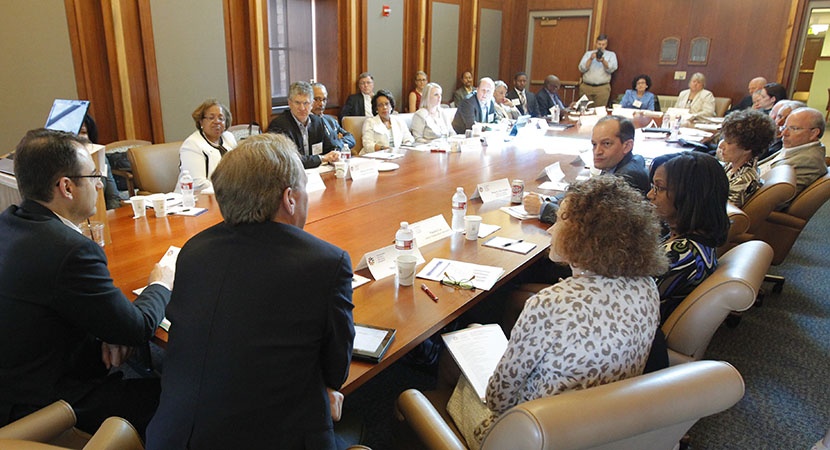
Participants during the Roundtable Discussion on Diversity in the Nation's Law Schools.
Ideas Put Forward for Consideration at LCLD Annual Meeting
At the upcoming LCLD annual meeting in September and in the months following, LCLD’s Pipeline Committee will be studying the observations and informal recommendations that came out of this summer’s “Roundtable Discussion on Diversity in the Nation’s Law Schools.”
Hosted on June 19 by the University of Colorado School of Law, this was the first such conference of deans, general counsel, and managing partners to grapple with increasing diversity in the nation’s law schools.
“This is a shared concern for all of us,” said University of Colorado School of Law Dean Philip J. Weiser. “We have a lot of work to do to ensure that we’re increasing the pipeline, supporting diverse students, and enabling them to thrive as legal professionals.
The 30 participants represented 12 law schools, 10 corporations, five law firms, and other legal industry and research professionals.
“This was an unusual gathering for me,” said Joanne Epps, Dean of Temple University Law School. “I came to learn what some of the best practices are for increasing the number of diverse lawyers and in hopes that this group could increase the number of best practices."
“I heard new ideas.”
During the course of the seven-hour discussion, a range of topics were considered, including LSAT preparation, the US News & World Report ranking system, the advantages and relatively broad acceptance of holistic admissions, pre-law curricular issues, transition into law school, experiential (versus solely academic) learning, and career economics and job market realities. The discussion was informed by a presentation from BWB Solutions on the “Current State of Diversity and Trends—Are We Closing the Gap?”
The participants put on the table ideas that warranted further exploration, “local” practices that may be worthy of replicating nationally, criticisms of the current “system,” practical experiences, frustrations, questions, and a broadly held desire to see changes made.
Among the highlights of the discussion:
- Make sure that diverse students can afford the bar prep course and don't have to work while preparing for the bar.
- Change regulations through which the federal government interprets what can and cannot be in the budget for a student loan so students can use proceeds to pay for bar prep courses.
- Build on successful pilot efforts in some states to enable law schools to offer a bar prep course as part of the law school curriculum in the final semester of law school.
- Broaden the availability of bar prep coaches and expand nonprofit bar review courses.
- Use applicant interviews for prospective law students, not simply as an evaluative technique for screening applicants, both as a means of increasing exposure to, and understanding of, the minority academic community.
- Look at internship programs that give students in their junior year of college practical experience in the legal profession.
- Use orientation clinics to give entering law students more confidence. (Those who completed these programs move through course material with more ease.)
- Help students create a narrative of themselves and build their own portfolio. Make themselves more marketable.
- Redouble efforts to help law students understand the culture (appropriate etiquette) of law.
- Expand pre-1L summer boot camps. Offer long-term mentoring opportunities from 1L on.
- Change career services offices into centers for professional and leadership development; create personal assessment plans for students.
- Have students work across disciplines to build a sense of personal confidence in their own discipline as they interpret it to others.
During the roundtable, Peter Kalis, Managing Partner of K&L Gates, noted that it is newsworthy for a law school when an alumnus from that school is later selected by the LCLD for its prestigious Fellows program. The Fellows are 8 to 12 years into their careers and on a fast track to leadership positions. They can be an encouragement to law students from diverse backgrounds, he said.
At the day’s close, Brad Smith, Microsoft General Counsel and Co-Chair of the roundtable, talked about potential next steps.
“Programs at individual law schools, while numerous and usually successful, are not connected and are ultimately difficult to evaluate,” said Smith, “The many pipeline projects are in some sense like a clinical trial. We need to have a common basis on which one can assess the success of the programs—-a common statistical methodology that allows us to compare results across programs."
“We also need to have a method for scaling up the programs,” he said.
Said another participant: “With appropriate funding, it would be possible to get the records on the performance and cost across the programs. If corporate legal departments and law firms could fund a neutral organization to develop an analysis of the programs, and then tie them together nationally, that would be extremely useful.”
Again, from Brad Smith: “If we could invest in assessment and out of that develop models that would be scalable and sustainable, we could then attract funding. That could have a much bigger national impact.”
Joe Slay is an LCLD communications consultant.


